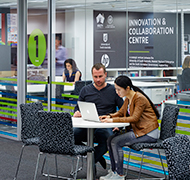01 March 2017
 The University of South Australia is encouraging aspiring startup founders to seek support from its many innovative programs as a new national report confirms universities are the driving force in Australia’s startup economy.
The University of South Australia is encouraging aspiring startup founders to seek support from its many innovative programs as a new national report confirms universities are the driving force in Australia’s startup economy.
Vice Chancellor Professor David Lloyd says the Startup Smarts: universities and the startup economy report is a timely confirmation of the central role of universities in creating new jobs and boosting the Australian economy.
“It is projected that startups will create more than half a million jobs in Australia over the coming decades and are already contributing more than $160 billion to the Australian economy,” Prof Lloyd says.
“The University of South Australia is focussed on building a vibrant environment of enterprise and engagement that provides tangible opportunities for students, graduates, staff, industry partners and the wider community to lead innovation and economic growth.
“The creation of the UniSA Innovation and Collaboration Centre (ICC) in partnership with Hewlett Packard and the South Australian Government was a first for any Australian university and a year after launch, it is successfully underpinning the next generation of entrepreneurs to succeed on a global scale.”
The Startup Smarts report, a joint project between Universities Australia and Startup Muster, is being launched today at the National Press Club by Universities Australia Chair Professor Barney Glover.
The report confirms that more than four out of five startup founders in Australia are university graduates and that there are now more than 100 startup support facilities and entrepreneurism centres at Australian universities.
Data from Startup Muster’s survey of 600 startup founders in 2016 included in the report also reveals that around one in five startup founders in Australia have benefited from a university acceleration or incubation program.
ICC Manager, Jasmine Vreugdenburg, says the report confirms the indispensable role universities play in Australia’s largest job creation sector – entrepreneurial startups.
“At UniSA we are proud to provide the skills, training, support and the physical space to nurture the next generation of entrepreneurs and equip them for a future in which many more will seek to establish their own business,” Vreugdenburg says.
“The ICC provides a multidisciplinary environment where SME’s, students and entrepreneurs can access a wide range of expertise to help them develop their products and grow their business across the whole innovation lifecycle - from idea generation to growth and expansion.
“The Venture Catalyst initiative provides seed funding of up to $50k and support to startup companies at the critical survival stage while the Innovation and Growth Series supports startups and SMEs to translate key research outcomes for innovation and growth.
“UniSA’s Centre for Business Growth then assists companies in the growth phase through the delivery of programs and assessment clinics to support CEO’s and executives.
“matchstudio provides value to companies at various stages of their lifecycle by introducing innovation through user-centered design projects, accessing students as well as research for the creation of new concepts, products and services for industry.
“And then UniSA Ventures and the Partnership Engagement Team provide commercial advice and connections for research and development within UniSA and with industry partners to maximise commercialisation opportunities.”
Thanks to a Venture Catalyst grant and a level business head, brothers and Vinnovate business founders, Simon and Joshua Schmidt, are well and truly on the path to entrepreneurial success with their wine screwcap technology.
Through the Venture Catalyst program Simon and Joshua were encouraged to look at other applications for their ingenious Vinnovate technology, which allows consumers to tailor wines to their own tastes.
“That advice opened our eyes to the broader potential of our innovation and was an important lesson in considering the bigger picture,’’ Joshua says.
“We have now made sizeable inroads into other opportunities and with that has come the realisation that there are real commercial prospects for this technology.”
Vinnovate has had significant interest from major carbonated beverage companies, an industry which has an estimated annual revenue of $4 billion in Australia alone and the technology also has potential health and humanitarian applications providing clean drinking water in remote areas as well as response mechanisms in the wake of natural and man-made disasters.
Media contact: Katrina McLachlan mobile: 0414972537 email: katrina.mclachlan@unisa.edu.au


